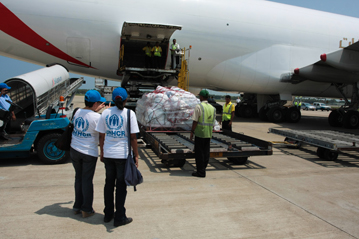Timor: alarming pattern of forcible removal
Timor: alarming pattern of forcible removal
The first interviews done by UNHCR with East Timorese in Dili indicate an alarming pattern of well-planned and well-organized forcible removal of East Timorese to other parts of Indonesia. The first testimonies show that there was a clear pattern of separation of families, with members of the same families spread around different islands of Indonesia. It is too early to say how many people were affected but the numbers were certainly substantial.
Attempts to intimidate and forcibly remove East Timorese by sea were still being made in Dili harbour after the arrival of the first Australian peacekeepers, when militia gangs switched from gun and machete brandishing to lower-key but still deadly methods of intimidation.
UNHCR staff managed to alert the Australians who secured the port area to prevent further deportations. The people are now safe under the peacekeepers' guard in the Dili stadium (200 persons) and a secured port area (500 persons). Only UNHCR has access to them and we are now able to verify the voluntariness of any departures.
On Thursday only 3 Javanese families expressed their wish to leave for Java.
The relief operation meanwhile is gathering momentum: this morning 9 tons of plastic sheeting as well as jerry cans and medical kits for 30,000 people were airlifted to Dili. Two truckloads of supplies were immediately taken to Dare where there are an estimated 67,000 displaced people. A second airlift will follow later today. A barge is also arriving from Darwin with other supplies.
A four-member UNHCR team is headed for West Timor together with representatives of other UN agencies and the government. The group is supposed to set up a plan of operations for West Timor.
The issue of international access to West Timor's overcrowded camps, often ruled by anti-independence militias, is absolutely crucial to give at least some relief and protection to the people in the camps and to ensure that all those who want to go back to East Timor will be allowed to do so.









